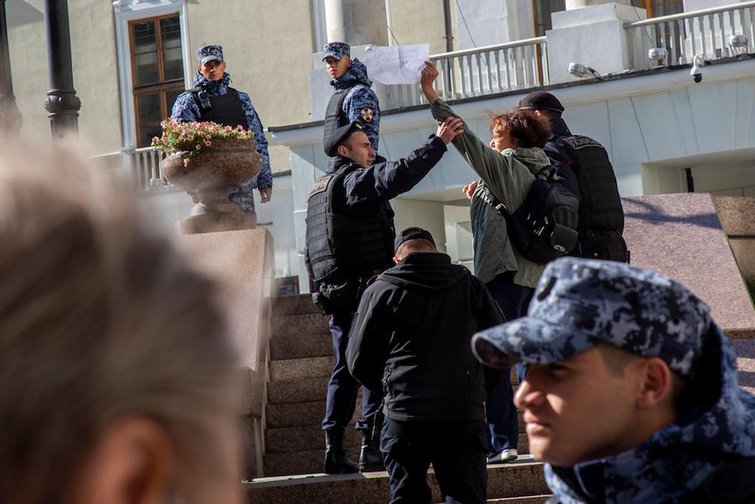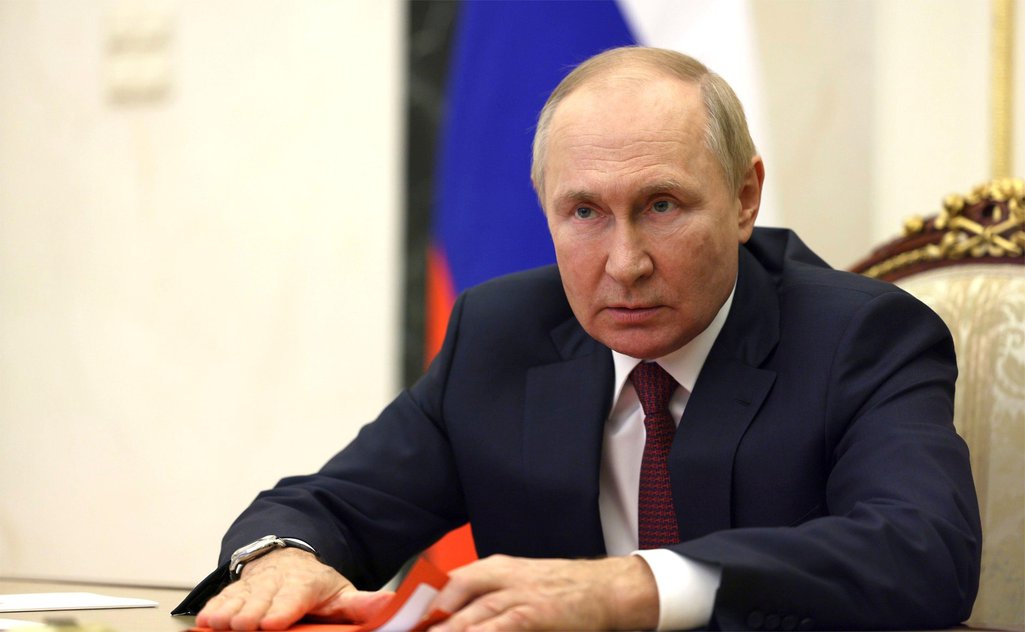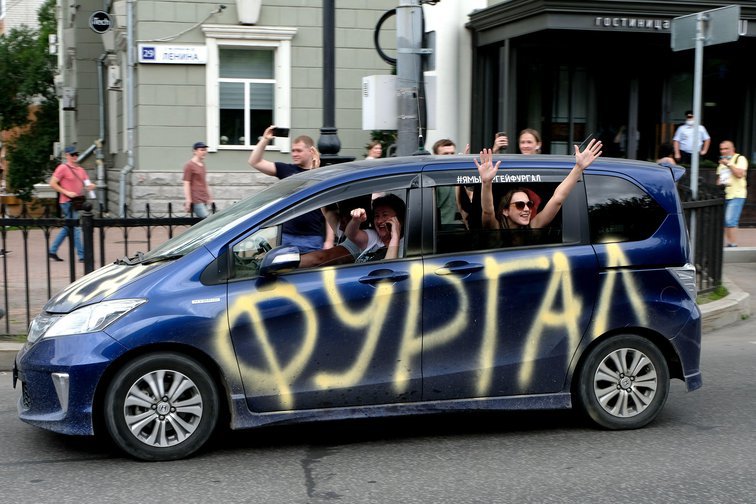Since the Ukraine war began, the West has asked why Russians aren’t marching on the streets. The answer is simple
Sergey Smirnov
5 October 2022

Russian law enforcement has targeted the very initiatives
that call for protests, leaving few routes for mobilisation |
(c) Nikolay Vinokurov / Alamy Stock Photo. All rights reserved
The Kremlin’s war on Ukraine, and especially the mobilisation announced in September, are a real shock for Russian society.
Even if you factor in pro-government opinion surveys, there are millions of people in Russia who are dissatisfied with what is happening. And the people who most disagree with the Russian government are young people. According to the most conservative estimates, the number of under-25s against the war is equivalent to the number of people of all ages who support it.
But why aren’t these people out on the streets of Russian cities?
This is one of the West’s most asked questions since the invasion of Ukraine in February. The simplest answer is this: because Russians support the war and Russian president Vladimir Putin
It’s an argument used frequently by Western politicians, and one that is used to justify closing international borders to Russian citizens. ‘Fight inside your own country’ is a familiar slogan. Eastern European politicians and citizens make this point particularly often. Which is understandable: they feel the pain of Ukraine more closely, remember life under Soviet occupation and fear a Russian invasion themselves.
In fact, to understand the absence of active protests in Russia, an analogy may help.
Soviet-style repression and rigged elections
In terms of ideology and repression, the Putin regime is similar to the Soviet regime and even tries to use elements of the Stalinist Soviet Union. Since the war began, laws have been adopted in Russia that can result in up to ten years in prison for soldiers surrendering to Ukraine’s armed forces.
If you spread ‘fake news’ – that is, any information about the war that contradicts the official line – you face up to 15 years in prison. In Russia, for even using the word ‘war’ (rather than the officially sanctioned ‘special operation’) you can face punishment.
Mass political protests were never a regular feature in the Soviet Union. While they certainly took place, the Soviet authorities severely suppressed them.
(c) Nikolay Vinokurov / Alamy Stock Photo. All rights reserved
The Kremlin’s war on Ukraine, and especially the mobilisation announced in September, are a real shock for Russian society.
Even if you factor in pro-government opinion surveys, there are millions of people in Russia who are dissatisfied with what is happening. And the people who most disagree with the Russian government are young people. According to the most conservative estimates, the number of under-25s against the war is equivalent to the number of people of all ages who support it.
But why aren’t these people out on the streets of Russian cities?
This is one of the West’s most asked questions since the invasion of Ukraine in February. The simplest answer is this: because Russians support the war and Russian president Vladimir Putin
It’s an argument used frequently by Western politicians, and one that is used to justify closing international borders to Russian citizens. ‘Fight inside your own country’ is a familiar slogan. Eastern European politicians and citizens make this point particularly often. Which is understandable: they feel the pain of Ukraine more closely, remember life under Soviet occupation and fear a Russian invasion themselves.
In fact, to understand the absence of active protests in Russia, an analogy may help.
Soviet-style repression and rigged elections
In terms of ideology and repression, the Putin regime is similar to the Soviet regime and even tries to use elements of the Stalinist Soviet Union. Since the war began, laws have been adopted in Russia that can result in up to ten years in prison for soldiers surrendering to Ukraine’s armed forces.
If you spread ‘fake news’ – that is, any information about the war that contradicts the official line – you face up to 15 years in prison. In Russia, for even using the word ‘war’ (rather than the officially sanctioned ‘special operation’) you can face punishment.
Mass political protests were never a regular feature in the Soviet Union. While they certainly took place, the Soviet authorities severely suppressed them.

The debate over whether Vladimir Putin is or isn't a dictator misses the point |
Gavriil Grigorov/Kremlin Pool/Alamy Live News
During the 20 years of his rule, Putin has built a repressive apparatus that is almost as effective as that of the Soviet Union. (The media outlet where I'm chief editor, Mediazona, covers it in detail.) Indeed, it was in the late 1970s that Putin began to work for Soviet state security, and this time period of the Soviet enterprise – from the mid-1960s to the mid-1980s – and the regime in East Germany, is probably a role model for the current Russian president.
But as well as the wholesale suppression of dissent, the blocking of independent media and the persecution of journalists, there is another detail that makes Russian society similar to the Soviet one. The Russian state has completely removed citizens from political life, swapping this absence of involvement for stability and a gradual increase in living standards, at least in large cities.
Also, it’s important to realise that, in Russia, there have been no elections in the Western sense of the word for a long time. When you see an election result for Putin and United Russia, Russia’s ruling party, remember the rigged results of the recent fake referendums in southern and eastern Ukraine, where allegedly more than 90% of citizens voted to join the Russian Federation.
(By the way, this is surprisingly similar to the voting results in the Baltic states after the Soviet occupation of 1940. That year, allegedly more than 90% of the inhabitants of Lithuania, Latvia and Estonia voted to join the USSR.)
In short, it makes no sense to talk about popular support for the Putin regime on the basis of election results.
It’s true, Russians are afraid to protest after 20 years of repression. Indeed, they prefer to avoid any contact with the Russian state altogether
Opinion polling data – although not always reliable – is another source of information about what Russian society thinks. Yet independent sociologists speak of a growing number of people who refuse to answer pollsters’ questions. Following the invasion of Ukraine, Russian sociologists have even suggested that the percentage of people contacted who agree to answer questions is as low as 5%.
It gets more complicated if you agree to answer the pollsters’ questions. For example, if you do not support the Russian invasion, how do you answer the question of whether you support Russia’s military actions in Ukraine – when there’s a chance you may face a punishment for speaking out, from a fine to a prison sentence.
So, it’s true, Russians are afraid to protest after 20 years of repression. Indeed, they prefer to avoid any contact with the Russian state altogether. At the same time, despite the huge salaries on offer (up to 4,000 euros per month), the Russian army has failed to find a sufficient number of volunteers for the war in Ukraine. And this is after the Russian state and propaganda have called for volunteers.
The Russian authorities have long taught their citizens that street protests don’t work – and could make things worse.

2020: protests in support of Khabarovsk governor Sergey Furgal captured public attention in Russia |
(c) ITAR-TASS News Agency / Alamy Stock Photo. All rights reserved
In 2020, tens of thousands of residents of Khabarovsk, in Russia’s far east, took to the streets to protest against the arrest – which was largely seen as politically motivated – of the regional governor, Sergei Furgal. Two years earlier, 70% of the region’s inhabitants had voted for him in the gubernatorial elections – despite the authorities and Furgal himself asking them to vote for his opponent.
But the Russian authorities defiantly ignored the public, and the thousand-strong marches simply faded away. The authorities did not make any concessions, they sent another governor to the region, and he won the next election with the help of massive voting fraud.
In today’s Russia, with its million law enforcement officers, protesting is just as scary as it was in the Soviet Union. So people choose other forms of protest, including emigration.
Those who left Russia after mobilisation was announced were frightened of either dying in the army or ending up in prison if they refused to fight. For many of these people, protesting on the street was not an alternative – it was safer to flee. Especially since those who did go out to openly protest in large cities were handed summons for mobilisation. Modern Russia, just like the Soviet Union, considers military service as a form of punishment.
Everyone who criticises Russians for their cowardice, unwillingness to fight for their rights should remember: Russia looks increasingly like the Soviet Union. That’s why people aren’t protesting.
No comments:
Post a Comment